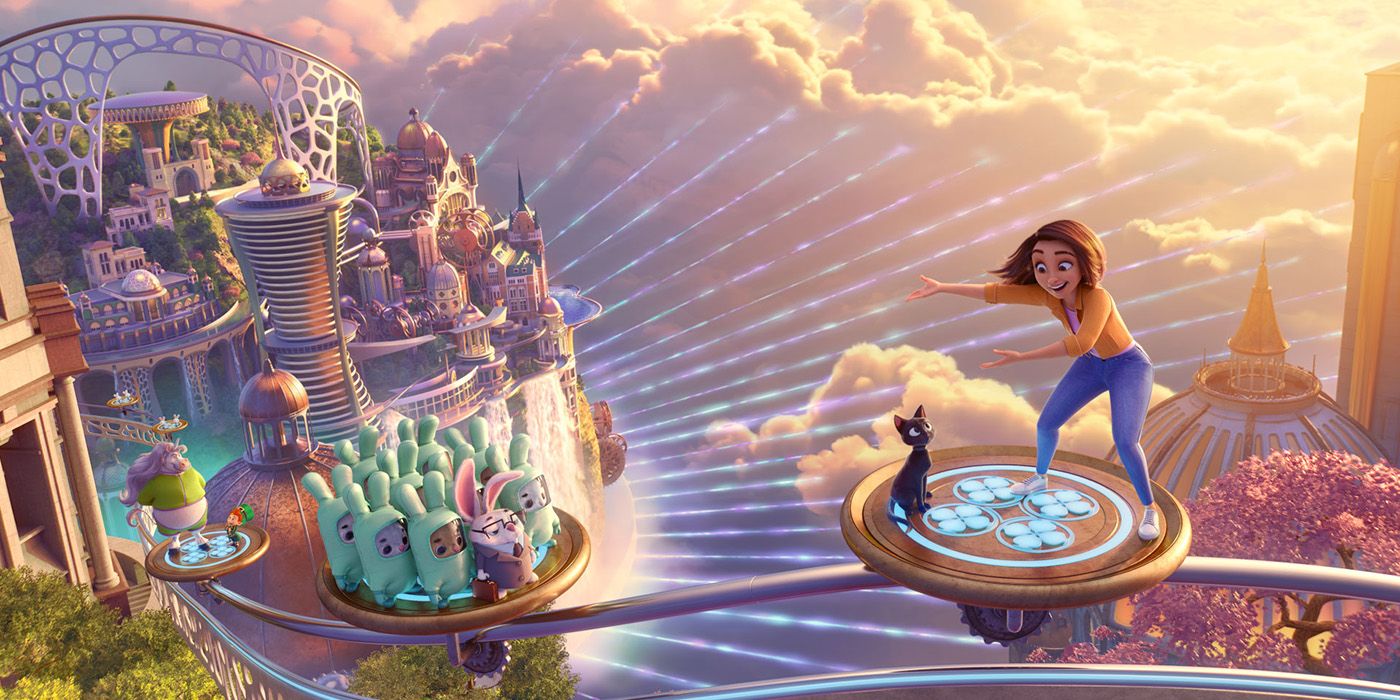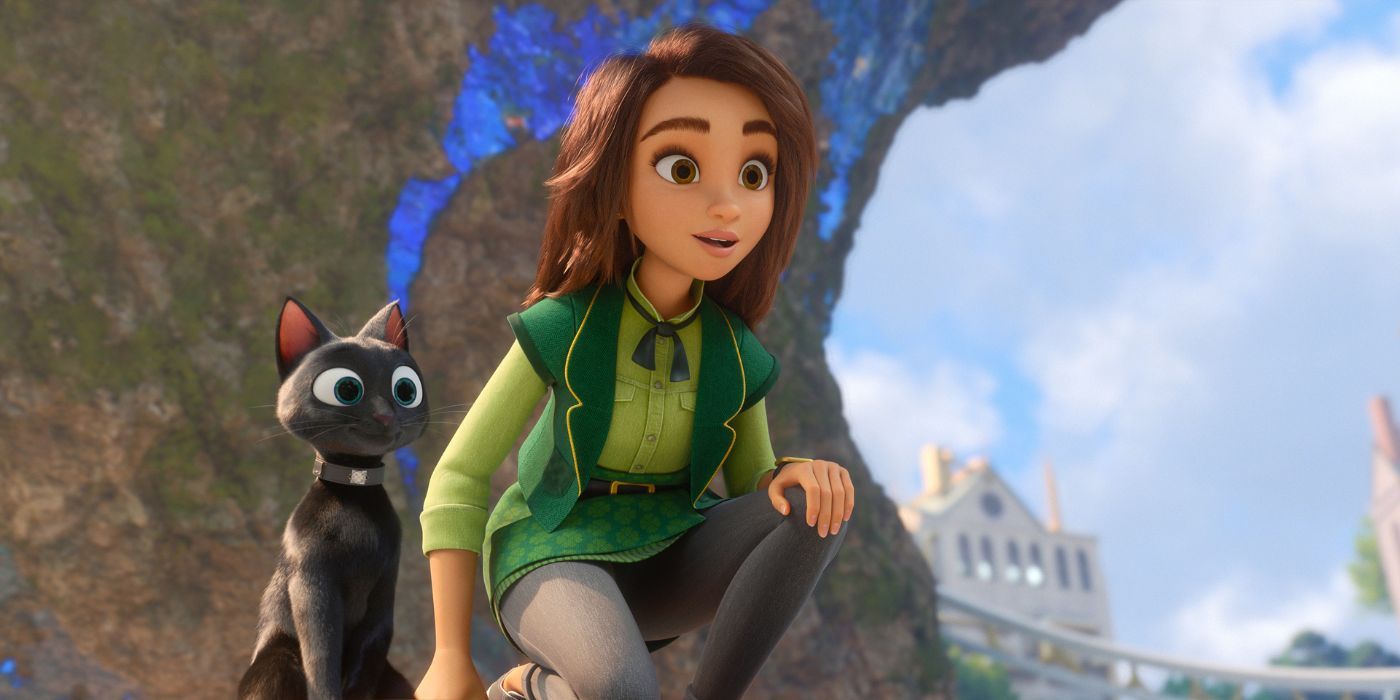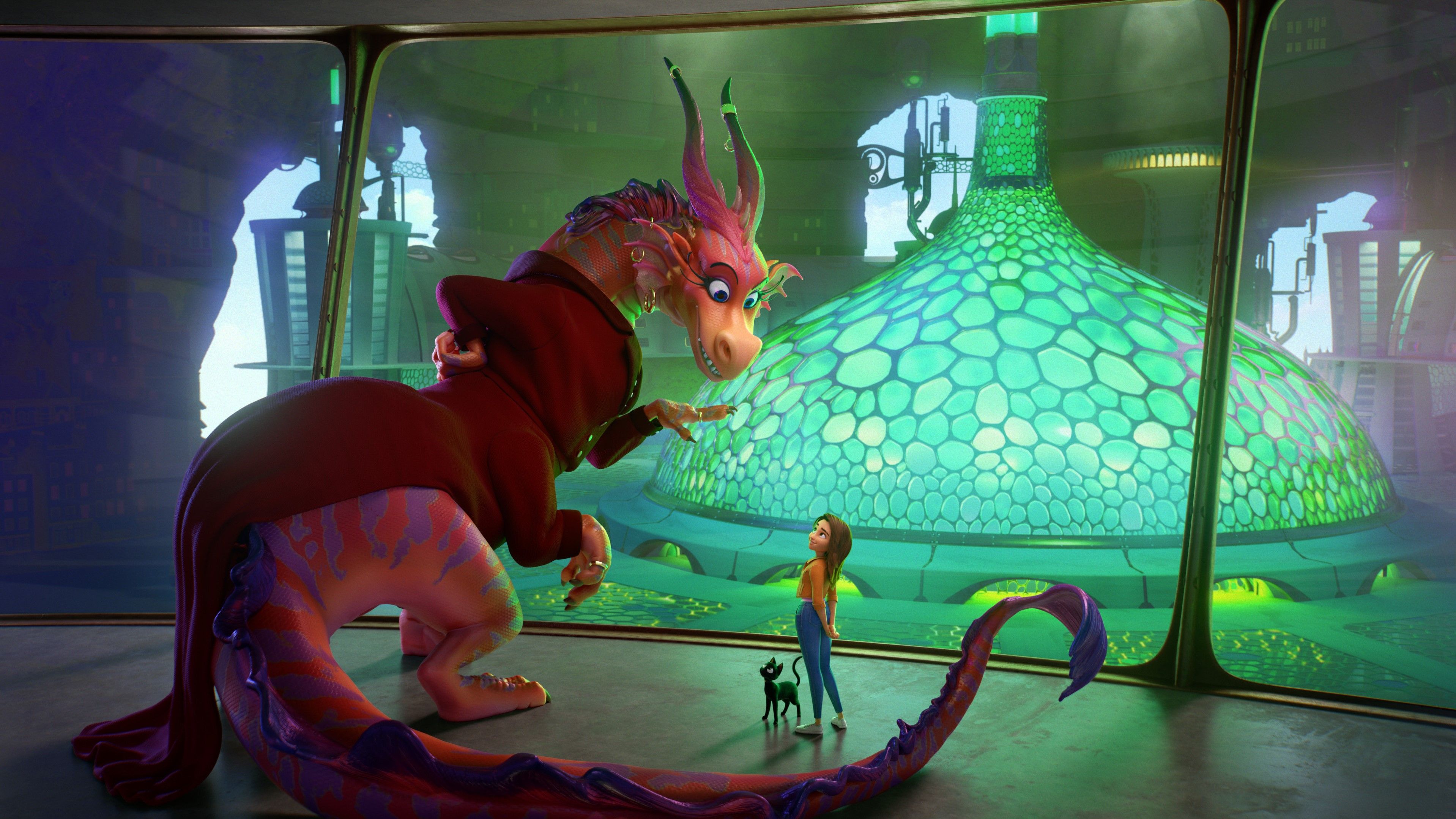The new animated film Luck, the first work from John Lasseter since his removal from Pixar over allegations of workplace sexual misconduct in 2018, is not very good. Generally derivative and poorly told, it also is the latest in an insidious trend in animation that kneecaps its imaginative potential to instead center around the banality of business. Even films that are ostensibly about a journey into the magical become more about corporate structures where everyone is bustling around working. Despite having the ability to create endless worlds where anything is possible, each of these works all end up falling back on making recreations of workplaces whose whimsy is smothered in mundanity. This crisis of creativity betrays a dearth of curiosity that continues to be felt in far too many works of modern animation.
In Luck, the story centers around the endlessly unlucky Sam (Eva Noblezada) who stumbles across the hidden Land of Luck when she follows a cat named Bob (Simon Pegg) through a portal he opens in an alleyway. While this sounds initially promising on paper, any spark of enchantment to this story soon slips away. Despite being home to everything from talking cats to dragons, it is structured around being a company of sorts. When Sam first comes through the portal, she must hide from two Leprechauns who we see are essentially Bob’s supervisors. They fill out a business report and talk about how they’re there to cover for someone who sounds like upper management. This is how we are introduced to the "magical" world where the majority of the film will take place. It is bureaucracy for the sake of exposition, setting up what will be the first of many narrative Macguffins the film gets tangled up in chasing down. When the two friends team up, they then go through a checkpoint that resembles the coldness of a subway turnstile. Bob must distract his “boss” while Sam sneaks through, a supposedly comedic moment that lacks any sense of authentic joy when wrapped in such prevailing tedium. Any glimpses we get of similar attempts at fun are all fleeting.
This is only the beginning. Sam must then disguise herself as a Leprechaun, dressing in their work uniform, which she steals from the employee locker room. Bob serves as her “orientation guide” as their cover story. The music then swells as they step out into the world, giving us our first real glimpse of the city as they begin their journey to the lucky penny depot. They observe creatures holding briefcases on their commute to work and do their best to blend in at what increasingly feels more like a Google campus than a magical world. They get information about what they have to do from a Leprechaun ally and join them as they clock in for work on a rotating assembly line. Apparently, even fantastical creatures can't get out of a dreaded 9 to 5. Lucky is most certainly not the first animated film to have this be central to its story, though it feels the most flat. What began in Monsters Inc as a more self-aware deconstruction of having "scaring" as a job has instead become a regressive fallback. That early Pixar film was appropriately silly because of the juxtaposition of hulking monsters going through their day-to-day with a sharp sense of humor. Luck and other recent films lack that same self-awareness, instead playing up the focus on work without any vision to it.
In Soul, a film with a lot of interesting potential lurking under the surface, the very foundation of our inner beings found in the Great Before has been “rebranded” into being called the Youth Seminar. It is populated with clipboard-carrying figures all roaming around to direct what is effectively job training for being alive. While the film has an ending epiphany that is quite poetic, it is hard to shake the main feeling of being put through an orientation for the job of being alive.
Alongside that was Inside Out, a film where the most vibrant and profound of feelings become like a dysfunctional workplace of conflicting personalities. While this, too, found something more touching toward the end about finding peace with all of yourself, the way it structured itself still was initially geared around emotion as a workplace. Even in a creative experience like Coco, the afterlife is inexplicably turned into a bureaucratic border run by employees that determine who is free to travel. It existed to create some sort of conflict in the story, though the idea that this spiritual realm would be governed by the business of borders always felt perpetually off. While animated films often make the intangible into something tangible that they can represent visually, all of these choices remain constrained by the lack of imagination about this different world. Each end up being fixated upon all-too-familiar ideas and systems rather than taking the plunge into the unfamiliar. While it can be difficult to create a world from scratch and all of us will draw from what we know, it's odd that such a prevailing reference point is work. Is there not more to living and storytelling than this?
All of which brings us back to Luck. The film primarily makes its way through the confines of various “departments” of luck. While there are some moderately funny jokes here and there, it still is perplexing to see so much of the film operating on the conveyor belts of this magical corporation. It all ends up being more banal than it is ever funny or creative. Bunnies work at computer terminals, magical crystals are primarily for powering buzzing drones, and even the unlucky world is just a mirror of the lucky one except with more construction. Everything just ends up feeling maddeningly mechanical, stripping away all the joy to make everything into cogs in the corporate machine. While younger audiences might get swept up in the brighter colors and poop jokes, they also will likely be less interested in the way everything feels like a job. The whole film is surprisingly narrow in its ambitions, making its way through the various levels of the world that lack much of any variety to speak of. Even the first real conversation with the dragon at the head of the corporate hierarchy takes place within an office after they go over the last memos of the day. While there are many offenders of taking a magical premise and making it digestible to the point of being dour, Luck is the worst of the bunch.
This cinematic trend in animation, while it can be done well, also can all too easily diminish even the most vibrant of vision. No matter how well-animated or written these stories are, it becomes woefully less engaging when centered around a corporation as opposed to creativity. When it is an already lackluster film like Luck, it can spell doom for any residual artistry that may sneak through. Its failure is a testament to why more animated films ought to welcome the limitless opportunities within magical premises. Even when it may lack the same grounding point, it has a greater chance at becoming something far more memorable that doesn't feel like merely a reflection of our own professional lives. Luck is a new low for this issue, taking what is a growing trope and making it into its sole personality. Instead of creating something new, it builds itself around the conception of work as ruling everything. It ends up feeling like Sam just traded her job in the real world for a slightly different one. It is a film that just won’t get out of its own way and embrace the infinite of imagination. As a result of its tepidness, what could be remarkable is rendered utterly unremarkable and forgettable.



